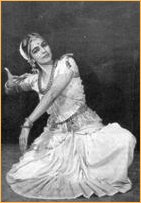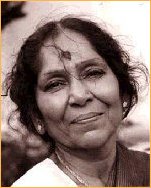
|
 |

|
 |
In response to the "Point of view" by T J S George, Sunday Express dated 14th September 2003, this rejoinder was written by V P Dhananjayan (founder & president, Bharata Kalanjali) to the editor, New Indian Express / Sunday Express, Chennai Ref: Article: Remember Rukmini, but why forget Bala |
| October
3, 2003
Remembering Rukmini Devi on her birth centenary year does not mean Balasaraswathi is forgotten. This comparison at this juncture is totally unwarranted. A few decades ago a section of the Music Academy Brahmin coterie raised Bala against Rukmini Devi. There were better performers of Sadir at that time too, but Balasaraswathi was chosen by the coterie because of her grandmother Veena Dhanammal and mother Jayammal who were in the limelight and close to Music Academy Brahmin cliques. Then they said Sadir or Daasiattam is a prerogative art form of the Vellalar or Devadasi community and Brahmin ladies have no right to touch the art. 

1. There is no comparison between Rukmini Devi and Balasaraswathi. While Bala is an individual, Rukmini Devi is an institution only to be compared with Rabindranth Tagore or Vallathol Narayan Menon. 2. Bala has not left any lineage to be reckoned with, whereas today Kalakshetra branches are all over the world and any individual or institution who wants a systematic Bharatanaatyam technique goes for Rukmini Devi's lineage. 3. All said and done, Bala scored more on her musical virtuosity rather than Naatya histrionics. 4. Rukmini Devi's "Sringara" is not based on vulgar display of eroticism in public, but aesthetic beauty in poetic suggestiveness. Her "Sringara" delineations in her productions of Kumara Sambhava, Geeta Govinda, Kutralakuravanji are monumental examples of sensitive love lyrics. Watching her perform or teaching the nuance of 'rati sringaara' to her students was an everlasting experience. 5. As commented by one of the New York critics, "Kalakshetra Bharatanaatyam technique is as ancient as Naatyasaastra itself and as contemporary as a New Yorker...there is nothing that you cannot draw from that style of dance...". This comment could be attributed to the monumental theatrical creation of Rukmini Devi wherein one can find the evolutionary changes in the presentation not deliberately created for the sake of change or novelty, but as an integral part of the deep-rooted technique. 6. Rukmini Devi certainly elevated the standard of our performing art forms to respectability, not by making it Brahmanical, which is a very mischievous term to denote an art form practiced by all sections of our community. Purity in thoughts and action is not attached to Brahmins alone. 7. If one analyzes the facts that followed Rukmini Devi's entrance into the field, one would realize that no one has contributed as much as she did for the entire art form and Bhaarateeya Samskriti (Indian Culture). Kamala, through popular media (film), made the art form accessible to the general public and E Krishna Iyer certainly contributed a great deal in supporting Rukmini Devi's aesthetic approach to "a low class Sadir" as quoted by the writer. 8. It is wrong to say that Kamala and Iyer had no pedigree connections, they indeed had, look back into their life history before coming to conclusions of such absurd notions. 9. One gets status not just by the practice of art or any profession, but ones own conviction, character, caliber and credentials - those go beyond mundane nature. 10. It is the monumental institution Kalakshetra who reminds people of the legacy of Rukmini Devi with hoardings. Bala may or may not have hoardings when her centenary year comes after two decades, but self projecting hoardings of present generation of artists will certainly adorn the streets in the years to come. I am sorry to conclude by saying that Mr. George's article 'Point of view' has no pointed view that has any truth in it. V P Dhananjayan Chennai, India |